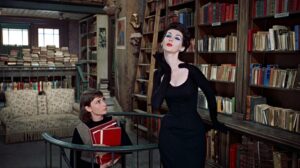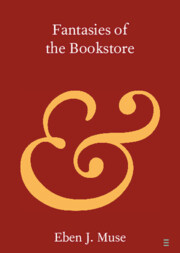
This website started from watching Funny Face (1957, starring Fred Astaire and Audrey Hepburn) several years ago. In the film, Hepburn is quietly working in a dark and dreary bookstore called Embryo Concepts when a fashion magazine film crew crashes in unannounced, locks her out of the store, and proceeds to make a complete mess of the books for their fashion shoot. Then they depart, leaving wrack and ruin in their wake. Only Astaire stays behind, maybe wanting to help clean up or, more likely, wanting to chat up Hepburn. (It is important while watching this film that you pretend you don’t know how much older Astaire is than Hepburn.)
Hepburn starts clearing the books, collecting a large pile, carrying them across the room, and dropping them on the correct shelf. She does not place the pile carefully; several books fall to the floor. Rather than pick them up, Hepburn merely looks down, shrugs her shoulders, and turns away. Watching that moment, I realized that this bookseller does value the books she sells. Her passion is philosophy and the only value the books have for her is the access they provide to the philosophical ideas they contain. In the 21st Century, she would be reading eBooks, not pBooks. A few minutes later in the film, she abandons the store for a trip to Paris to meet one of her philosopher heroes in the flesh.
The scene raised for me the question of what a bookstore is all about. Not whether they have value in a digital, networked world, but what those values are. In Funny Face, Embryo Concepts is a dark room in a New York basement. Hepburn’s shopkeeper appears stressed and repressed, in desperate need of the freedom and light that Paris and Astaire will bring. This bookstore is a place for hiding from the world.
So I set out to see what others had to say about bookstores in their fictional visions. I discovered about 500 novels written during the past 125 years in which bookstores (or their lack) featured heavily. They include mysteries (often called bibliomysteries), romances, fantasy novels, your adult, LGBTQ+, literary fiction, and other genres. The largest genre is bibliomystery, and book series often focus on the murders with which booksellers become involved.

In 2022, I gathered the details of these bookstore novels into a Cambridge University Press “Element”, Fantasies of the Bookstore. The CUP Elements are mini-monographs, limited to 30,000 words. In Fantasies I was able to introduce the range of themes informing these novels, and the range of meanings that the spaces of the bookstore are given. The bookstores in these novels create the potential for events, a space of possibility defined by the people in them, their location in time and in geography, and the books that fill their shelves (and sometimes floors).
In this website I want to build on that mini-monograph, giving each of the books more space for consideration and reflection. I don’t expect to have 500 pages, but I hope to select the most interesting bookstore novels and book series, and demonstrate the vast potential of the bookstore space.